■Making a dream a reality
An ambitious dream to establish a university of science and technology in Egypt with “Japan” in its name first introduced at official occasion was the Second Meeting of the Japan-Arab Dialogue Forum hosted by Egypt in March 2004. The background of this dream was that Egypt was facing a crisis of human resource development in science and technology. The Japanese government was originally perplexed when it received the request to establish a university in Egypt that included “Japan” in its name, wondering if it was really possible. Nevertheless, following repeated discussions between the Egyptian and Japanese governments, in October 2008 the Egypt-Japan University of Science and Technology (E-JUST), a JICA technical cooperation project, was launched in Borg El-Arab City in Alexandria. For the establishment of E-JUST, the Japanese Supporting University Consortium (JSUC) incorporating 12 Japanese universities was formed by JICA and started providing support for dispatching academics to Egypt from four core universities, namely Tokyo Institute of Technology, Kyoto University, Waseda University and Kyushu University, as well as employing faculty staff,formulating a department strategy for running majors and curriculum development. In February 2010, E-JUST opened as a Graduate University with 30 students enrolled.
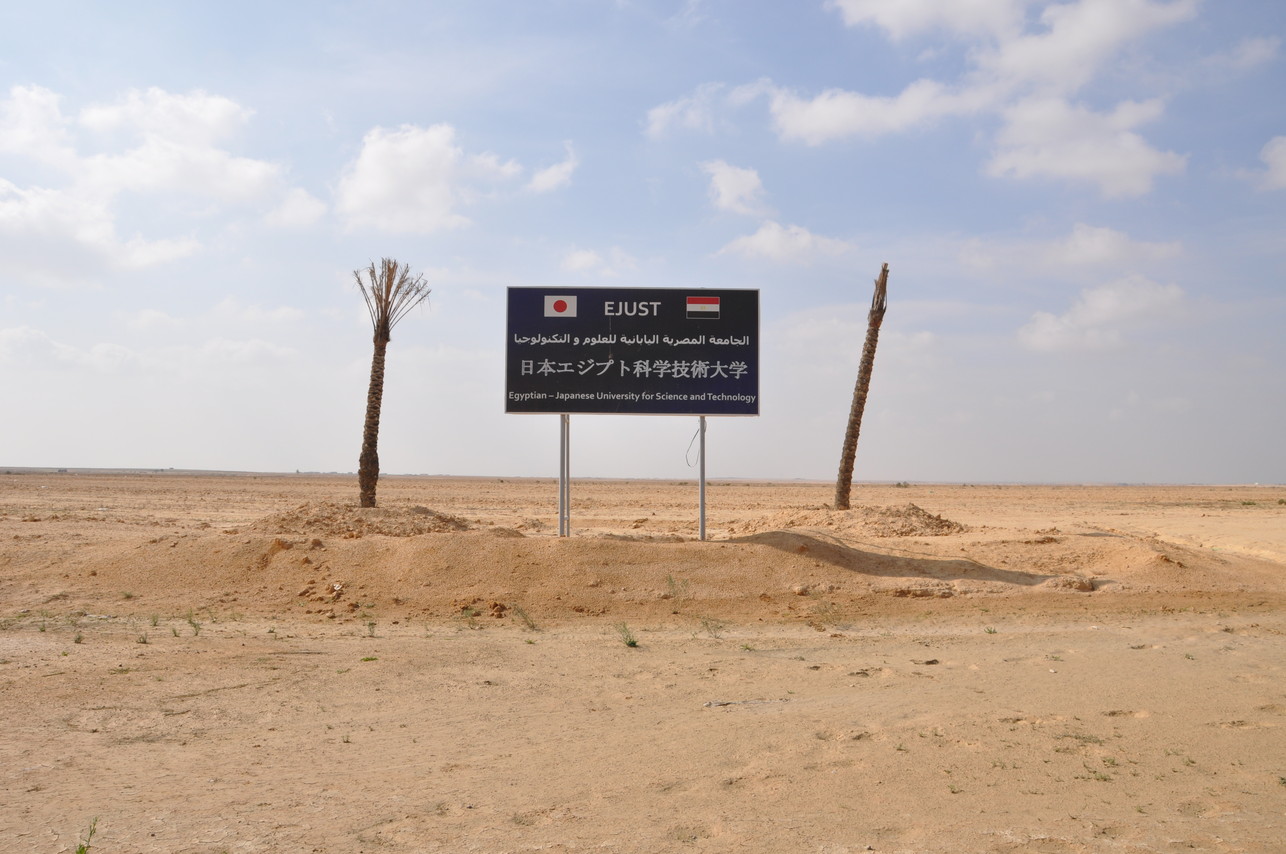
Site of the proposed campus in 2008
E-JUST’s history was a history of challenges. Although the university had opened its doors, there were several challenges including the lack of progress in campus construction, classrooms and labs located in a renovated student dormitory, the absence of laws applicable to E-JUST which is neither a national or a private university, and the effects of the Arab Spring and social unrest. Nevertheless, faculty members and government representatives from both countries as well as JICA staff worked fiercely to grow the project as a partnership project that went beyond the framework of international cooperation. In 2016, international entrance examinations were held, and the university began accepting international students from Africa. In 2017, The Faculty of Engineering and the Faculty of International Business and Humanities (FIBH) were launched .
The situation in national universities in Egypt at that time was that education had become mass produced (huge lecture rooms filled with students) following the introduction of free university education, with 280,000 students at Cairo University and 170,000 at Alexandria University. Teaching was lecture based and focused on imparting knowledge, the research environment was fragile, and cooperation between industry and academia had not been matured. As well as fostering skilled human resources to support development in science and technology, the mission of E-JUST is to be a role model for graduate education and research institutions in Egypt. E-JUST practices lab-based education in its graduate programs, provides a basic grounding in science and engineering, and practical lessons in its undergraduate programs, and promotes Japanese-style seminar education.
■Lab-based education in graduate engineering studies
Graduate schools in Egypt generally focus on course work with research conducted on a one-to-one tutoring basis. Collaboration with other students or faculty members is limited and students pursue their research theme under the guidance of their supervisor. Under such situation, lab-based education was introduced. Lab-based education is aimed at fostering human resources through collaborative research among diverse players, such as students and faculty members, in a lab community with a specific research theme. When this project was launched, the Egyptian academics who came on a study visit to Japan said, “In labs in Japan we saw teachers and students doing research together. We don’t know whether that would work in Egypt which has a different culture.” Nevertheless, as well as sending Egyptian academics to Japanese universities for a set period of time toward introducing such a system in Egypt, a system of Japanese academics teaching at E-JUST was established, nurturing the culture of lab-based education. Knowledge and skills are not the only things students learn in a lab. The students were continually asked by faculty members why they were doing the research, how it would benefit society, and what they hoped to achieve through the research, urging them to think ahead into the future One student said that his present self as a researcher was founded on what he had learned through such questions and dialogue with Japanese academics. E-JUST doctoral students have the opportunity to study at a university in Japan for a period of 6-9 months, supported by scholarships from the Egyptian government. Through lab activities in Japan, the students first hand experienced the value of lab-based education. The students who obtained a degree at E-JUST are now practicing lab-based education in national universities across Egypt.
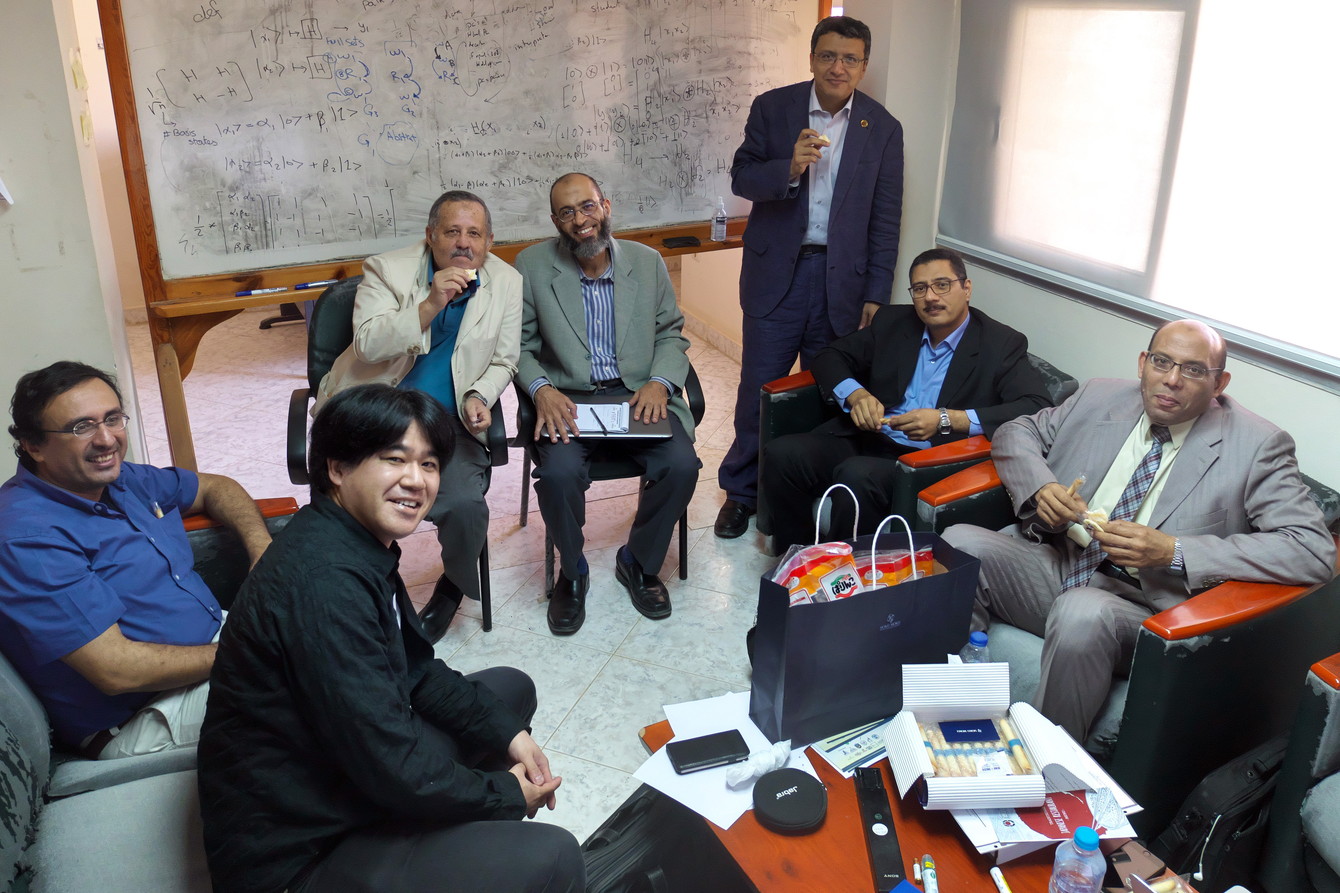
Lab scene
■Establishment of basic science and engineering subjects in Faculty of Engineering and enhancement of understanding through practical training
E-JUST started getting ready to establish bachelor’s programs around 2016. Around that time, the Japanese academics who tutored the graduate students at E-JUST pointed out that the students did not have a sufficient grounding in mathematics, chemistry and physics, the basics of science and engineering, which they should have learned at high school, and were unable to properly utilize them in practical situations. When we looked at the Egyptian high school mathematics teaching materials, the contents focused on learning how to solve problems and not on fostering the ability to use acquired knowledge to deal with other issues. Prof. Masaaki Suzuki, First vice-president of E-JUST and a key player in the establishment of the Faculty of Engineering, pointed out that “in general, students at universities in Egypt learn applied engineering and try to develop expertise with only a perfunctory basic education in mathematics, chemistry and physics, resulting in learning focused on getting the right answer by memorizing formulae.” E-JUST Faculty of Engineering ensures the acquisition of basic academic skills through study of basic science and engineering subjects. It has also designed practical lessons aimed at improving understanding through practical training. As well as developing curricula with the support of Tokyo Institute of Technology (Tokyo Tech), E-JUST sent academics and technical support staff to Tokyo Tech to learn how to provide support for practical lessons, and developed and introduced teaching materials. This thorough grounding in basic science and engineering subjects and improved understanding through practical training is a pillar of E-JUST Faculty of Engineering.
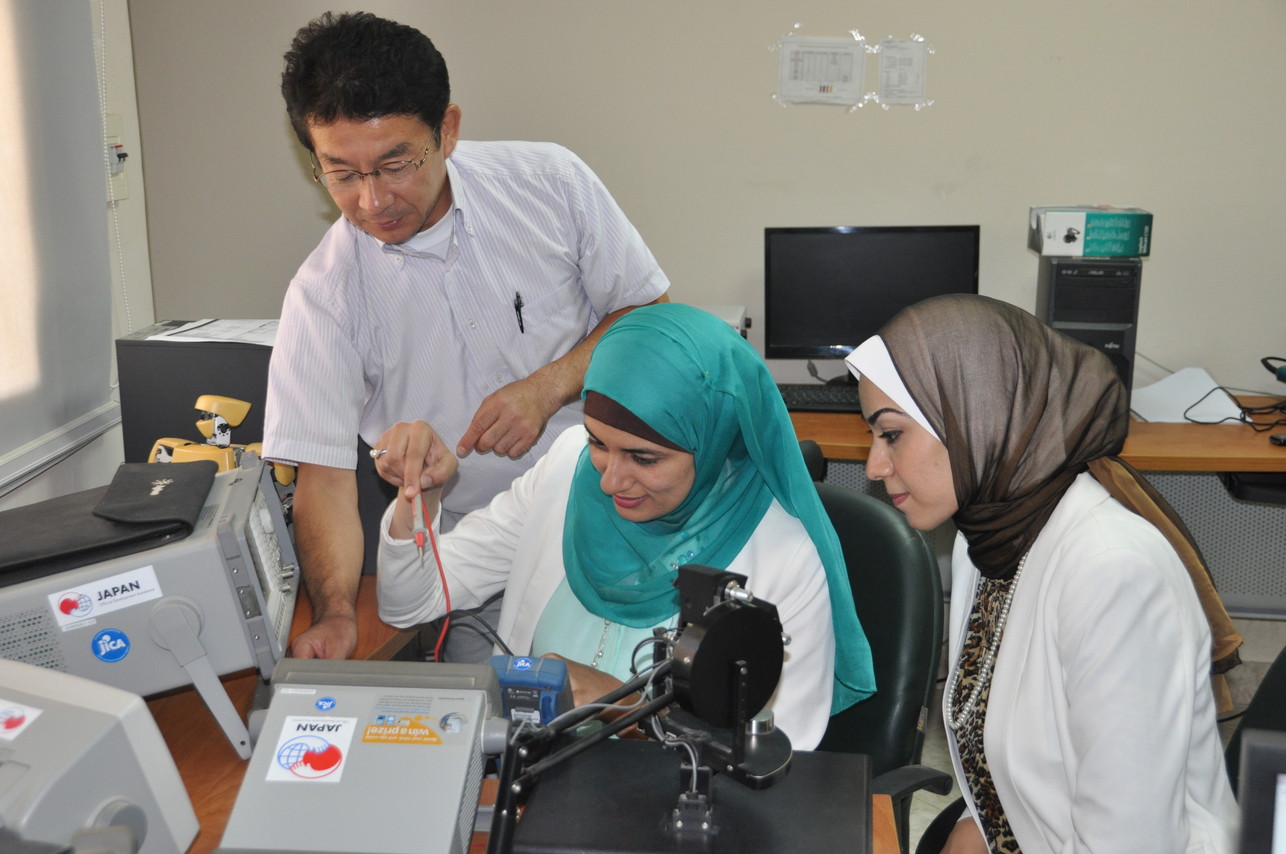 |
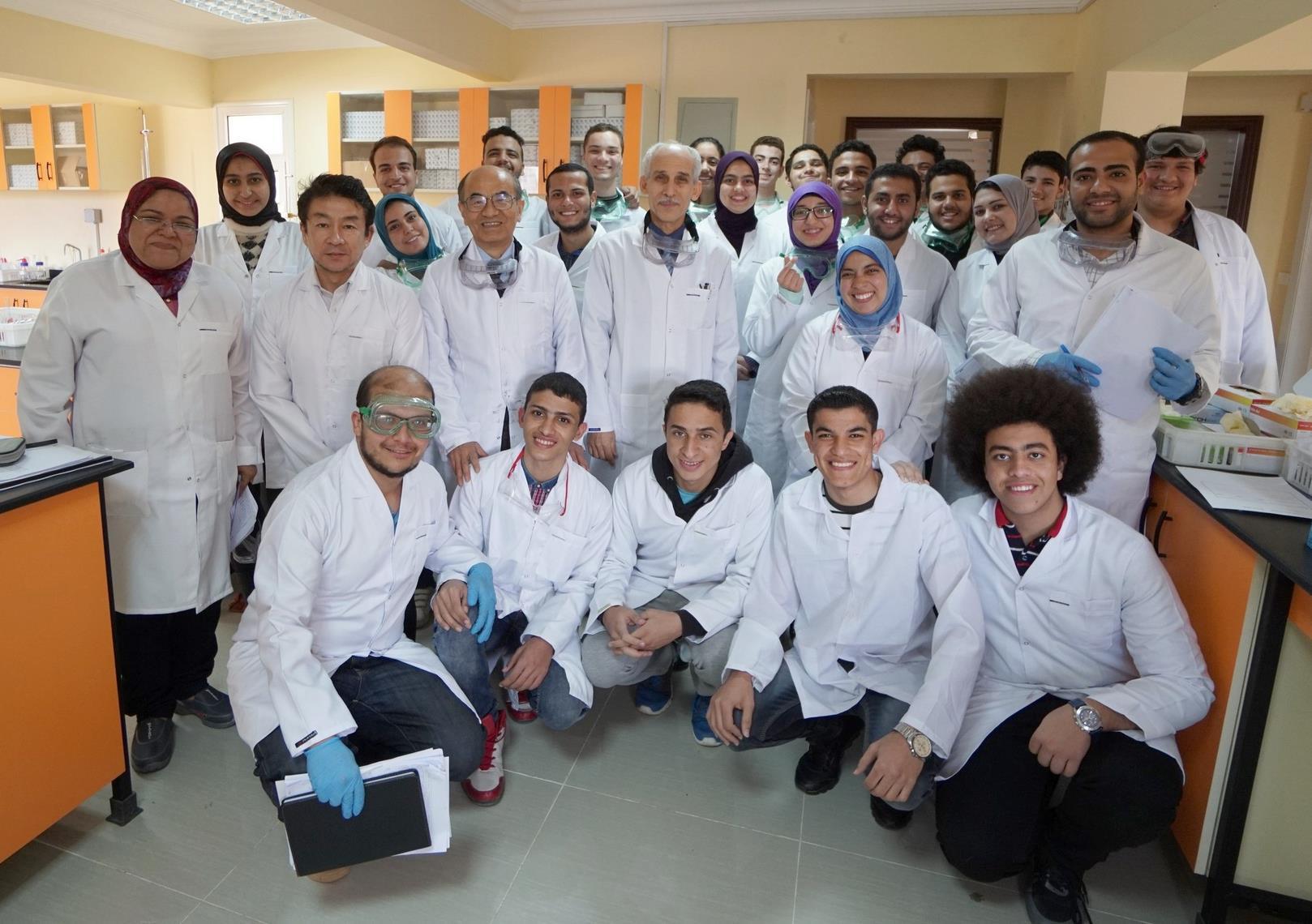 |
|---|---|
| Practical training in progress | Technical support staff |
■Introduction of Japanese-style seminar education in Faculty of International Business and Humanities (FIBH)
Education in Egypt is typically considered that academics with knowledge feed knowledge to students who does not have. In order to efficiently feeding of that knowledge, education focuses on sedentary learning in huge lecture halls. E-JUST introduced Japanese-style small-group seminar education aimed at triggering students’ awareness through debate with their peers, thus fostering their ability to express an opinion and grow their own thinking by incorporating the views of others. For students who thought that learning meant acquiring knowledge, learning through open-ended questions and discussion with their peers was a completely new experience. It was not only the students who were left bewildered. It was also very difficult for the Egyptian academics to understand and implement as a facilitator the concept of creating an environment where students interactively learn from each other. For this reason, as well as remote co-teaching with Japanese academics, recently Japanese academics participate remotely in E-JUST seminars and in tutoring the students in their graduation research, thereby contributing to improvement of the quality of seminar education. The Egyptian academics recognize its effectiveness saying, “The students participate in the lessons proactively and learn from each other, leading to greater motivation to study.” Unfortunately, seminar style classes are only provided for first- and second-year students, but some E-JUST academics have begun incorporating the concept of interactive seminar education in their own classes.
■Conclusion
As of February 2023, E-JUST ranked top in Egypt since 2014 for the number of papers written per academic and ranked 22nd at Arab region in the Times World University Rankings 2021. It has a student body of more than 3,000 including over 120 international students from Africa. Launched in 2008 with 30 students, E-JUST continues to grow as one of the leading universities in Egypt. It still faces many challenges, including an autonomous management base, further promotion of future partnerships with Japanese universities and the mechanism for such, and establishment of the reputation of E-JUST graduates in industry and academia. Going forward, E-JUST will continue to grow steadily as a research university in the Middle East and Africa.
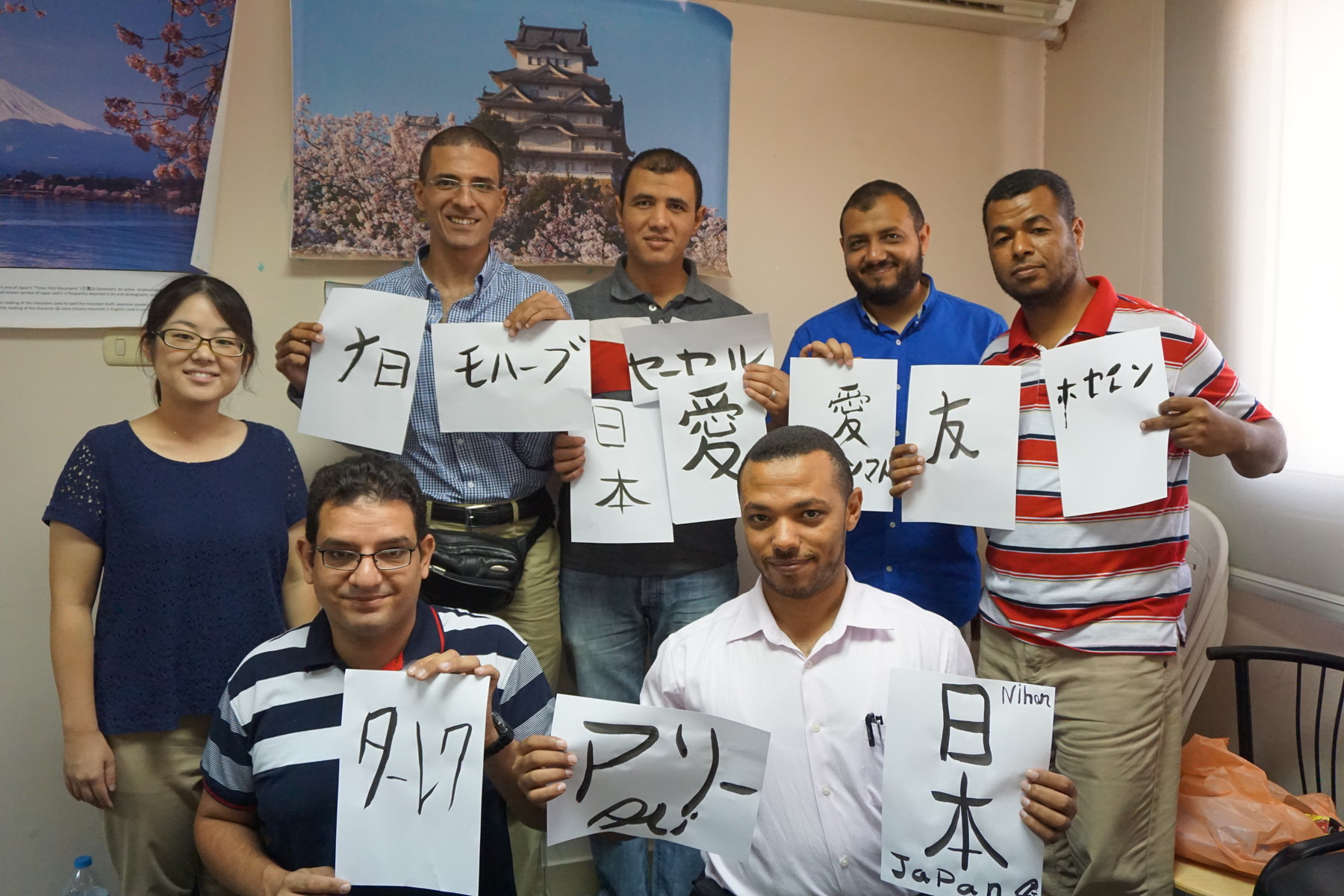 |
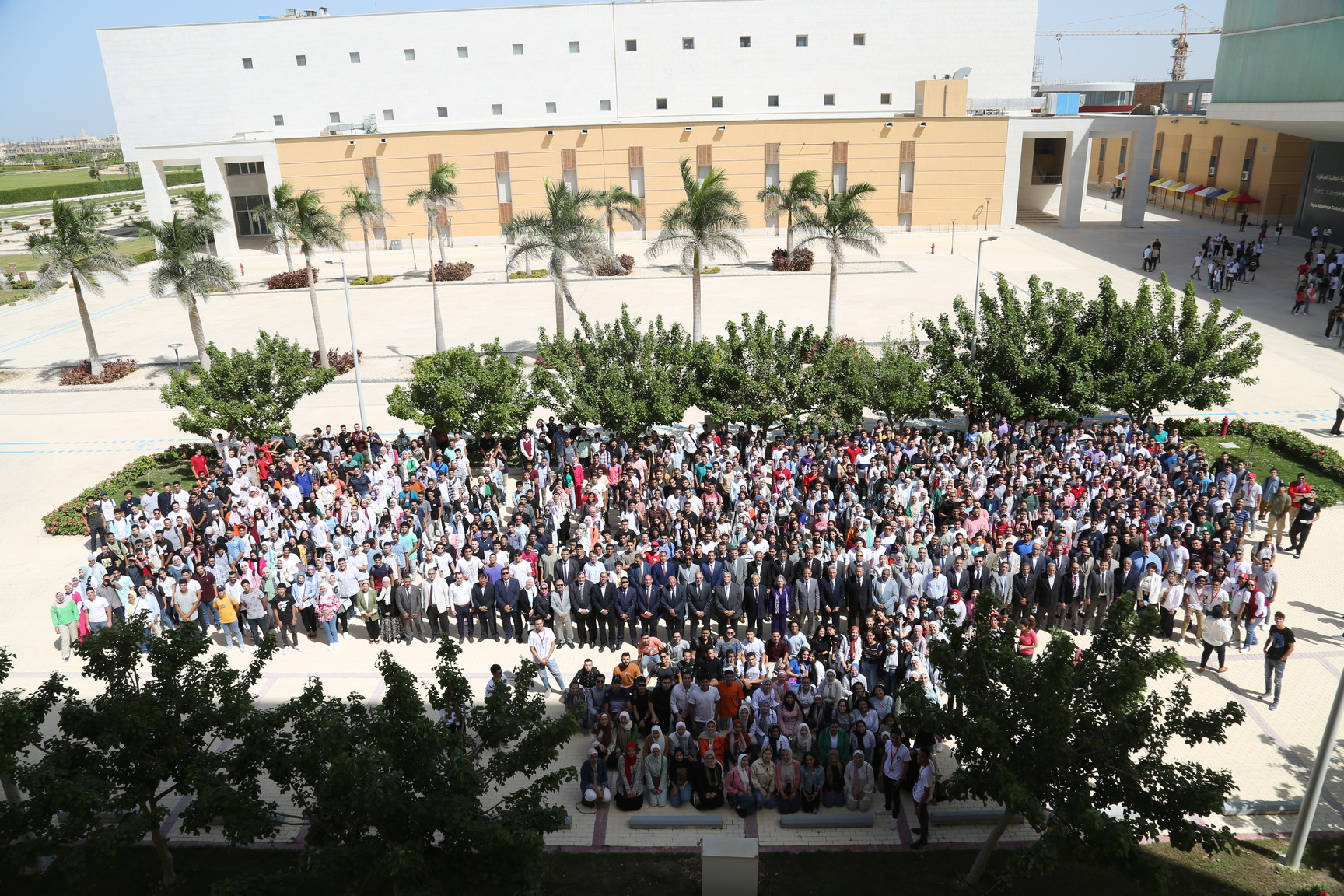 |
|---|---|
| Japanese culture event | Entrance ceremony 2022 |
For further information:
Click the URL below for E-JUST project newsletter, project information and other materials
https://sites.google.com/ejust.edu.eg/jica-ejust-project/home
__________________
■Profile
OKANO Takasei
Japan International Cooperation Agency (JICA) expert
Personal history: After graduating from university, in 2000 sent to Burkina Faso as Japan Overseas Cooperation Volunteer (JOCV) in the area of audiovisual education. From 2006, assigned to JICA Human Development Department as associate expert, mainly working in fields of higher education, and information and communications. After working on Hanoi University of Technology ITSS project (Vietnam) and project for establishing Tumba College of Technology (Rwanda), worked for 9 years on project to establish Egypt-Japan University of Science and Technology (Egypt) from 2008-2017. After that, worked on Malaysia-Japan International Institute of Technology project (Malaysia) from 2018-2021. In March 2022, returned to E-JUST project and is currently project chief adviser.
Degree: Ph.D. (Human Sciences)
Major: Educational technology, distance learning, engineering education







